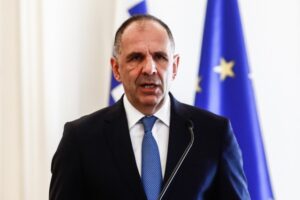“After decades of war and instability, the Middle East is indeed at a turning point today,” Foreign Minister Giorgios Gerapetritis said as he began his address to the UN Security Council meeting on the situation in the Middle East.
Gerapetritis said that the ceasefire agreements in Lebanon and Gaza, which show that “peace may indeed be possible” is a significant development.
The recent ceasefire and the release of hostages in Gaza, he said, are an example of “what can be achieved through political will.”
He praised Egypt, Qatar, and the United States for their “persistent mediation efforts” and stressed the need to complete all phases of the agreement to ensure “the release of all hostages and a permanent end to hostilities.”
He stressed that “the humanitarian situation remains dire, with millions of people in need of primary health care, education, and shelter”. The Council, he said, was urged to prioritise “the unimpeded and sustained flow of aid”. “The reopening of the Rafah border crossing and the reactivation of the EU-BAM Rafah mission, in which Greece participates, are welcome developments,” he said.
Gerapetritis noted that Greece is actively providing assistance to the people of Gaza, treating injured children in Greek hospitals, and supporting Palestinian families through humanitarian aid.
“We also continue to send humanitarian aid to support Palestinian families and, through the Greek Orthodox Patriarchate of Jerusalem, the Monastery of St. Porphyry in Gaza has proven to be a haven for a large number of our fellow human beings, both Christians and Muslims,” he said.
The Foreign Minister stressed the need for post-war planning, governance, security, and reconstruction in the region. “Palestinians should have a leading role in this process, as displacement could lead to regional instability,” he noted.
The international community should assist the Palestinian Authority in meeting its economic needs and implementing reforms to promote “good governance, strong institutions, and de-radicalization. The ceasefire provides momentum for the creation of a sovereign Palestinian state based on the two-state solution while ensuring Israel’s right to exist in peace and security.”
“The ceasefire agreement provides the necessary impetus for the revitalization of the political process, the creation of a sovereign Palestinian state based on a two-state solution under the relevant Security Council resolutions while recognizing Israel’s right to exist in peace and security,” he noted.
Mr. Gerapetritis made special reference to the month of Ramadan approaching, followed by Easter. “We recall the importance of the special status of the holy places in Jerusalem and Bethlehem. Given the universal importance of the holy places, I wish to reaffirm Greece’s deep interest in maintaining the status quo,” he said.
In Lebanon, Mr. Gerapetritis praised the formation of a new government under President Aoun and Prime Minister Salam. The “cessation of hostilities is also an extremely welcome development,” he said, adding that “the contribution of the US and France is acknowledged. Ensuring “the long-term security of both Israeli and Lebanese citizens is vital for sustainable peace.”
Greece, Mr. Gerapetritis said, will remain active in the discussions for the renewal of UNIFIL’s mandate in 2025 and continue to participate in the UN Mission.
On Syria, the Foreign Minister said that “security and prosperity are vital for the stability of the region”. A Syrian-led political transition under UN Resolution 2254, he said, should “pave the way for constitutional reform and fair elections,” ensuring a representative government without foreign interference. A return to normality, he noted, requires “a gradual lifting of sanctions, institution building, reconstruction and the return of Syrian migrants.”
“We support a political, Syrian-led, and Syrian-owned transition in the spirit of UN Security Council Resolution 2254. As the international community rushes to address Syria’s needs after 14 years of civil war, Syria must demonstrate its goodwill and fully respect the sovereignty of its neighbors, the rights of its neighbors under international law and especially the international law of the sea.”
Regarding maritime security, Mr. Gerapetritis pointed to the “extreme pressure” in the Red Sea due to Houthi attacks. Greece, he said, as the leading power in the EU’s ASPIDES naval operation, is committed to “safeguarding safety and freedom of navigation, as well as the protection of seafarers.”
Ask me anything
Explore related questions

